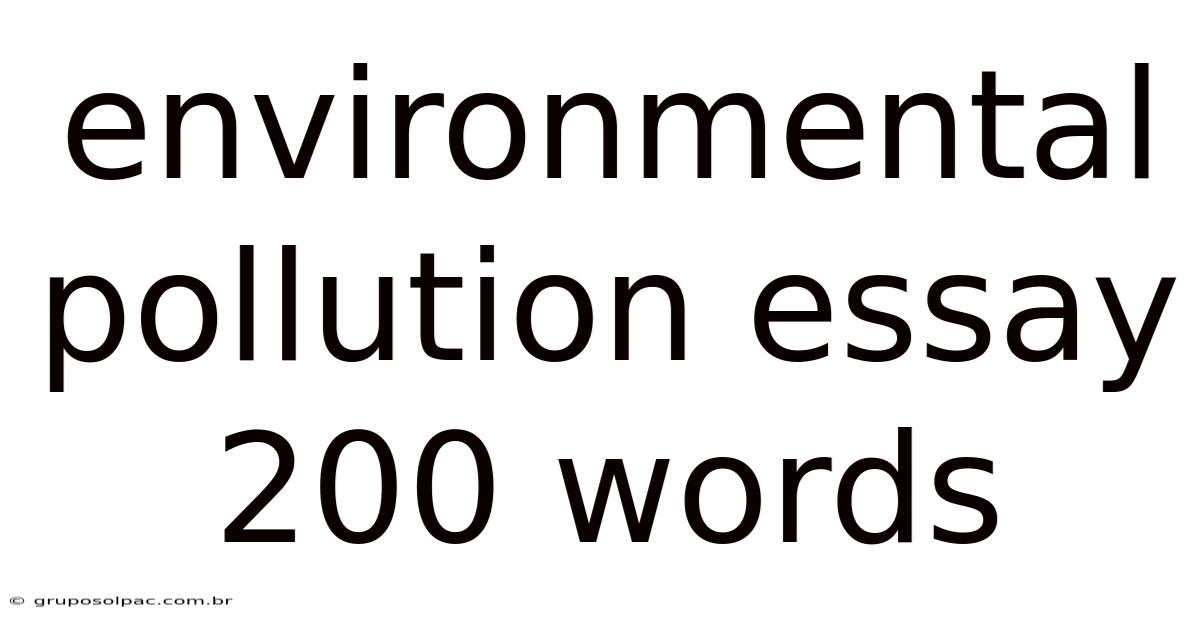Environmental Pollution Essay 200 Words
gruposolpac
Sep 12, 2025 · 4 min read

Table of Contents
Environmental Pollution: A 200-Word Essay Expanded
Environmental pollution, a pressing global crisis, stems from the release of harmful substances into the environment, degrading air, water, and land. This essay will explore the multifaceted nature of this pollution, its causes, consequences, and potential solutions.
Introduction: The Unseen Enemy
Pollution, in its various forms – air, water, noise, and land pollution – poses a significant threat to human health and ecological balance. The relentless industrialization and population growth exacerbate the issue, leading to an overwhelming accumulation of pollutants. Understanding the origins and impacts of pollution is paramount to devising effective mitigation strategies.
Causes: A Complex Web of Activities
The primary drivers of environmental pollution are multifaceted and intertwined. Industrial emissions release toxic gases and particulate matter into the atmosphere, contributing to air pollution and acid rain. Agricultural practices, including the overuse of pesticides and fertilizers, contaminate soil and water sources. Deforestation and unsustainable land management practices lead to soil erosion and habitat loss. Improper waste disposal contributes to land and water pollution, while vehicular emissions remain a major source of air pollution, particularly in urban areas. Furthermore, the extraction and processing of fossil fuels release greenhouse gases, driving climate change and exacerbating pollution-related problems.
Consequences: A Devastating Ripple Effect
The consequences of environmental pollution are far-reaching and devastating. Air pollution contributes to respiratory illnesses, cardiovascular diseases, and even premature death. Water pollution contaminates drinking water supplies, harming human health and aquatic ecosystems. Land pollution degrades soil fertility, impacting agricultural productivity and threatening food security. Noise pollution negatively impacts human and animal health, leading to stress, hearing loss, and behavioral changes. Moreover, pollution contributes to climate change, leading to extreme weather events, rising sea levels, and biodiversity loss. These interconnected consequences pose a significant threat to the planet's sustainability and human well-being.
Types of Pollution: A Closer Look
Let's delve deeper into the specific types of pollution and their individual impacts:
-
Air Pollution: This encompasses a wide range of pollutants, including particulate matter (PM2.5 and PM10), sulfur dioxide, nitrogen oxides, ozone, and lead. These pollutants are primarily emitted from industrial activities, vehicular exhaust, and the burning of fossil fuels. The health impacts of air pollution are severe, ranging from respiratory problems to cardiovascular diseases and cancer.
-
Water Pollution: This involves the contamination of water bodies with pollutants such as chemicals, heavy metals, pathogens, and plastics. Industrial discharges, agricultural runoff, sewage, and oil spills are major contributors. Water pollution poses a serious threat to aquatic life and human health, leading to waterborne diseases and disrupting aquatic ecosystems.
-
Soil Pollution: This involves the contamination of soil with harmful substances such as heavy metals, pesticides, and industrial waste. Soil pollution reduces soil fertility, harms plant growth, and can contaminate food chains. The effects can be long-lasting and difficult to remediate.
-
Noise Pollution: This refers to excessive or unwanted sound that can negatively impact human and animal health. Sources include transportation, construction, industrial activities, and loud music. Prolonged exposure to noise pollution can lead to hearing loss, stress, and sleep disturbances.
-
Light Pollution: Artificially produced light at night disrupts natural ecosystems and human sleep patterns. It obscures the night sky, impacting astronomical observations and affecting nocturnal animals' behaviors.
Solutions: A Collaborative Approach
Addressing environmental pollution requires a multi-pronged approach involving governments, industries, and individuals. Stringent environmental regulations and enforcement are crucial to control pollution levels. Technological advancements, such as cleaner energy sources and pollution control technologies, are essential. Sustainable practices in agriculture and industry can minimize pollution. Improved waste management and recycling programs are crucial to reduce waste generation. Public awareness campaigns can educate individuals about the importance of environmental protection and promote responsible behavior. International cooperation is crucial to address transboundary pollution issues. Finally, investments in research and development are necessary to find innovative solutions to combat pollution effectively.
The Role of Individuals: Making a Difference
While large-scale actions are essential, individuals play a crucial role in mitigating environmental pollution. Simple lifestyle changes can have a significant collective impact. These include:
-
Reducing energy consumption: Using energy-efficient appliances, reducing heating and cooling needs, and using public transport or cycling.
-
Conserving water: Fixing leaks, using water-efficient appliances, and practicing mindful water usage.
-
Reducing waste: Minimizing packaging, recycling, composting, and avoiding single-use plastics.
-
Choosing sustainable products: Supporting businesses that prioritize environmental sustainability and opting for eco-friendly products.
-
Planting trees: Trees absorb pollutants and help improve air quality.
-
Advocating for change: Supporting environmental organizations and advocating for stronger environmental policies.
Conclusion: A Call to Action
Environmental pollution is a complex challenge that demands immediate and concerted action. By understanding its causes, consequences, and potential solutions, we can work together to create a healthier and more sustainable future for generations to come. The time for action is now. Ignoring the problem will only exacerbate its devastating effects. Collective responsibility and a commitment to sustainable practices are crucial to reversing the tide of pollution and preserving the planet's precious resources. This requires a paradigm shift in our consumption patterns, industrial practices, and overall relationship with the environment. Only through conscious effort and collaborative action can we hope to mitigate the damaging consequences of environmental pollution and secure a healthy planet for future generations.
Latest Posts
Latest Posts
-
Mirror Is Transparent Or Opaque
Sep 13, 2025
-
Caste Discrimination In India Essay
Sep 13, 2025
-
Principles Of Successful Oral Communication
Sep 13, 2025
-
Oversubscription Of Shares Class 12
Sep 13, 2025
-
Application Of Buffer In Pharmacy
Sep 13, 2025
Related Post
Thank you for visiting our website which covers about Environmental Pollution Essay 200 Words . We hope the information provided has been useful to you. Feel free to contact us if you have any questions or need further assistance. See you next time and don't miss to bookmark.